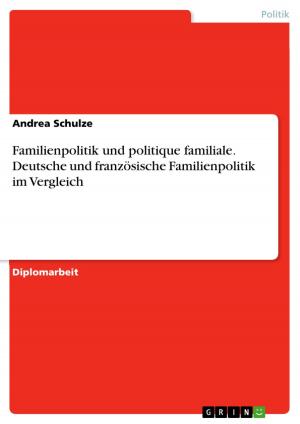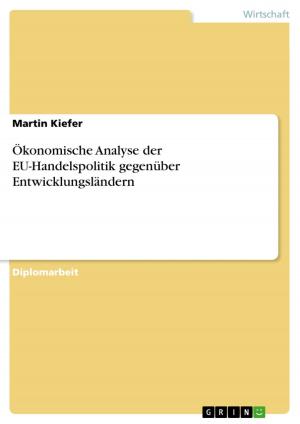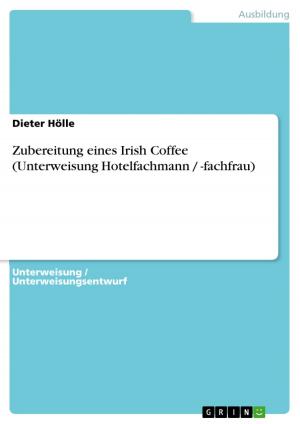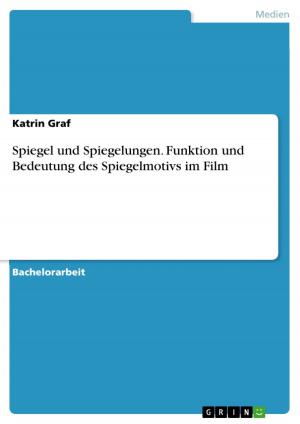Are the Council of Ministers and the Commission partners or rivals in European policy-making?
Nonfiction, Social & Cultural Studies, Political Science| Author: | Julia Heise | ISBN: | 9783638362276 |
| Publisher: | GRIN Verlag | Publication: | April 2, 2005 |
| Imprint: | GRIN Verlag | Language: | English |
| Author: | Julia Heise |
| ISBN: | 9783638362276 |
| Publisher: | GRIN Verlag |
| Publication: | April 2, 2005 |
| Imprint: | GRIN Verlag |
| Language: | English |
Essay from the year 2004 in the subject Politics - International Politics - Topic: European Union, grade: 1,5, University of Edinburgh, 36 entries in the bibliography, language: English, abstract: The European Union (EU) is a hybrid and unique body, which '(...) does not fit with many of our preconceived notions of how politics is organized.' (Cini, 2003-(a):1) Two aspects contribute to its 'distinctiveness': First, the EU has a two- level nature: it combines supranational with intergovernmental features. Supranationalism is defined as '(...) the existence of an authority that is 'higher' than that of the nation state and capable of imposing its will upon it.' (Heywood, 2000, 259). Applied to the EU, this definition would only concern the supranational EU- institutions. But supranationalism also refers to the common interests of the Union as a whole, and to most policy-areas, which are under the authority of the EU. The intergovernmental EU-level is characterised by the dominance of state-sovereignty. It relates to some EU-policy-areas and particularly to the special role of the 25 EU-member states, which have considerable influence within the Union. Both EU- levels have been subject to two different EU- integration theories. Neo- functionalism explains the creation and importance of a supranational stage with its core-concept of spillover. Intergovernmentalism is characterized by its state-centrism and focus on sovereignty. The second unique aspect of the EU, related to the first, is the complex EU-policy-making process. Legislation, developed by the EU- institutions, has to be implemented on a national level. Particularly the European Commission and the Council of the EU are main actors in policy-making. In this process, the Commission explicitly represents the Union's interests and is thus referred to as supranational. The Council shows strong intergovernmental characteristics. It acts on behalf of the sovereign EU-member states and therefore has considerable influence in policy-making. [...]
Essay from the year 2004 in the subject Politics - International Politics - Topic: European Union, grade: 1,5, University of Edinburgh, 36 entries in the bibliography, language: English, abstract: The European Union (EU) is a hybrid and unique body, which '(...) does not fit with many of our preconceived notions of how politics is organized.' (Cini, 2003-(a):1) Two aspects contribute to its 'distinctiveness': First, the EU has a two- level nature: it combines supranational with intergovernmental features. Supranationalism is defined as '(...) the existence of an authority that is 'higher' than that of the nation state and capable of imposing its will upon it.' (Heywood, 2000, 259). Applied to the EU, this definition would only concern the supranational EU- institutions. But supranationalism also refers to the common interests of the Union as a whole, and to most policy-areas, which are under the authority of the EU. The intergovernmental EU-level is characterised by the dominance of state-sovereignty. It relates to some EU-policy-areas and particularly to the special role of the 25 EU-member states, which have considerable influence within the Union. Both EU- levels have been subject to two different EU- integration theories. Neo- functionalism explains the creation and importance of a supranational stage with its core-concept of spillover. Intergovernmentalism is characterized by its state-centrism and focus on sovereignty. The second unique aspect of the EU, related to the first, is the complex EU-policy-making process. Legislation, developed by the EU- institutions, has to be implemented on a national level. Particularly the European Commission and the Council of the EU are main actors in policy-making. In this process, the Commission explicitly represents the Union's interests and is thus referred to as supranational. The Council shows strong intergovernmental characteristics. It acts on behalf of the sovereign EU-member states and therefore has considerable influence in policy-making. [...]















